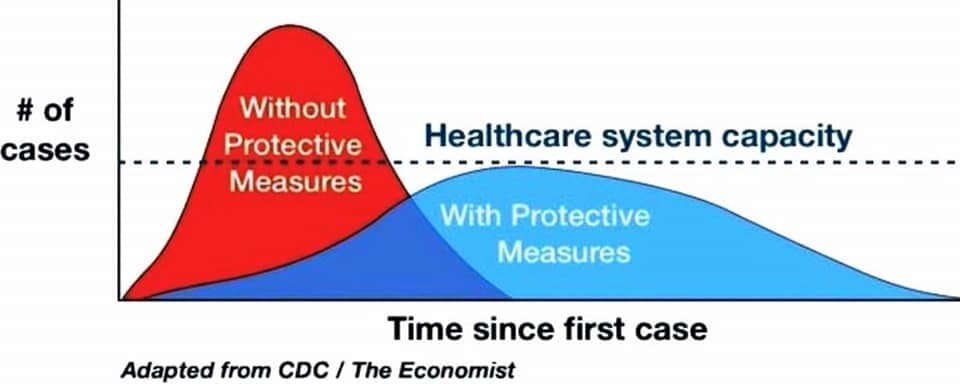
Coronavirus Disease 2019 (COVID-19) | CDC Online Newsroom | CDC
The sudden emergence of viral outbreaks like COVID-19 highlight the growing role of innovative healthcare technology in fighting the spread of infectious diseases.
The COVID-19 outbreak, which began in Wuhan, China, is now spreading to many countries, including South Korea, Iran, Italy—and now the U.S. As fears and anxieties surrounding the coronavirus continue to ramp up, telehealth and telemedicine solutions are playing a key role for patients and providers in containing the virus.
While the virus has proven to be lethal to certain patient populations, one of the largest concern right now is the Coronavirus’ reproductive factor (how contagious it is) being incredibly high – more than double than that of the flu. By taking measures to slow down the spread by limiting travel, avoiding conferences, etc, our hospital system will be able to provide the care to all who need it. This is known as “flattening the curve,” and it’s one of the best strategies we have at the moment for mitigating the situation.
Fortunately, innovation in healthcare has completely changed, creating options that weren’t available to us before.
Ten years ago, health experts didn’t have access to the sophisticated technology and analytics available today. The use of remote patient monitoring and other telehealth treatment and diagnostic options will offer vast insights into how innovation and technology are better equipping us to handle public health emergencies and contain the spread of diseases in the future.
On a Feb. 25 media briefing call, Nancy Messonnier, director of the CDC’s National Center for Immunization and Respiratory Diseases, stated, “Students [should work] in smaller groups or in a severe pandemic, close schools and use internet-based teleschooling to continue education. For adults, businesses can replace in-person meetings with video or telephone conferences and increase teleworking options. On a larger scale, communities may need to modify, postpone or cancel mass gatherings.”
Global outbreaks like the coronavirus incentivize healthcare operations to consider investing in telehealth/telemedicine options because it not only yields higher levels of utilization of their assets but protects a patient population from unnecessary exposure —even after the pandemic has passed.
Here are some of the digital health companies that have offered their services to help combat the spread of COVID-19:
cliexa: A mobile device platform that uses self-reported patient outcomes to remotely monitor patients with chronic health conditions. The platform provides a constant communication link between patients, their doctors and their EMR’s through real-time monitoring. The cliexa solution could prove to be an extremely valuable tool during the coronavirus pandemic that providers could use to remotely monitor patients from day one of quarantine and throughout the potential illness.
Intelligent Observation: Seth Freedman, Founder & CEO of Intelligent Observation, has revolutionized hand washing technology.
It’s extremely important that people practice proactive hand hygiene during times like these. Intelligent Observation is an electronic hand hygiene compliance tracking tool that is more accurate, more detailed and truly scalable than any other competitive offering.
XRHealth: Virtual reality telehealth services for a smarter, more enjoyable recovery.
XRHealth: A company that makes health-focused virtual reality applications, is providing Israel’s Sheba Medical Center with VR headsets that will allow doctors to monitor COVID-19 patients remotely and enable quarantined patients to “travel” beyond their rooms using VR.
MediSprout: MediSprout has created an efficient and cost effective way for patients and physicians to connect. MediSprout’s digital solution helps doctors provide better care, see more patients and operate more profitable practices while allowing patients to set up virtual calls for common questions, script refills or schedule follow-up care—all from the comfort of their own home, using a secure video call.
HabitAware’s Keen bracelet vibrates to make you aware of where your hands are.
HabitAware: Health experts are urging the seemingly impossible, “stop touching your face” to help prevent the spread of COVID-19… But how—when most of us touch our faces 20x/hour without even thinking about it?
HabitAware makes Keen, a smart bracelet that helps manage nail biting, hair pulling, thumb sucking and other subconscious behaviors by sending a vibration to alert you of your actions. Customized gesture detection brings you into awareness and helps you develop healthier habits. HabitAware technology is spreading awareness, instead of germs.
Some health applications like Buoy are using symptom-checkers based on guidelines from the CDC. Larger organizations like American Well and Doctor on Demand are offering patients a way to book an online consultation with a physician to help determine if they should go straight to the emergency room, see a doctor in-person or head to urgent care.
COVID-19 is the first major viral outbreak in the last several years and it presents digital health companies with an opportunity, if not an obligation, to see how their solution can help. If you’re interested in tracking the current spread of the coronavirus, researchers at Johns Hopkins University have created a visualization of the virus’s progress based on official numbers and confirmed cases.





